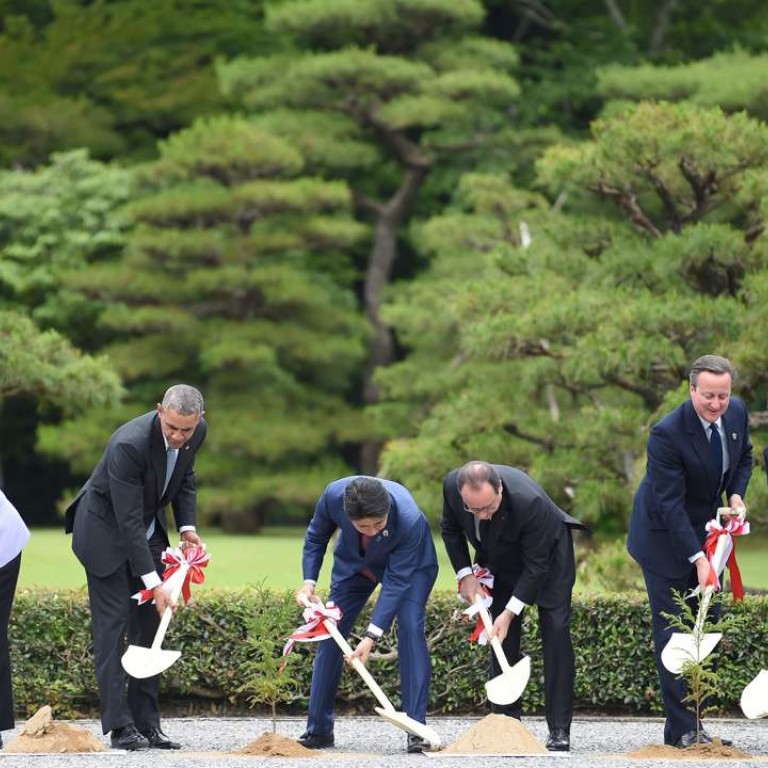
Update | G7 leaders vow to send ‘clear signal’ over South China Sea row after Beijing warns it against ‘double standards’
Leaders of the Group of Seven nations agreed yesterday to send a strong message regarding maritime disputes in the East and South China seas, where China is locking horns with Japan and its Southeast Asian neighbours.
The pledge by the seven economic powers, whose leaders are meeting in Japan, came after China warned the bloc against engaging in talks that might worsen tensions in the South China Sea.
G7 members must take an “impartial and fair position instead of applying double standards or the mindset of alliances”, Foreign Minister Wang Yi said. “We don’t want to see discussions or actions that might exacerbate tensions in the region.”
China aims for deeper regional military ties in bid for stability in South China Sea
G7 members could decide their own topics of discussion, but they should not do anything that might negatively affect regional tensions, he said.
Foreign ministry spokeswoman Hua Chunying said the G7 should focus on economic cooperation rather than “pointing fingers at something outside its portfolio”.
The seven heads of state from Britain, Canada, France, Germany, Italy, Japan and the United States started their two-day summit in a mountainous region about 300km southwest of Tokyo yesterday.
The global economy topped the agenda, with the leaders calling for flexible spending to spur world growth and Japanese Prime Minister Shinzo Abe making a pointed comparison to the 2008 global financial crisis. The global refugee crisis is also on the agenda.
Security vs economics: Asean countries stuck between US and China in South China Sea row
Japan’s Deputy Chief Cabinet Secretary Hiroshige Seko said Abe led discussions on the East and South China seas.
“Other G7 leaders said it is necessary to issue a clear signal,” he said. But the G7 communique was unlikely to mention China in the context of the South China Sea, he added.
At last month’s gathering of G7 foreign ministers, a joint statement on maritime security expressed “strong opposition to any intimidating, coercive or provocative unilateral actions that could alter the status quo and increase tensions”.
Tensions between China and its neighbours are on the rise over Beijing’s assertiveness in handling territorial disputes.
Outgoing Philippine President Benigno Aquino yesterday accused China of breaking a US-brokered deal between China and the Philippines on the Scarborough Shoal.
On South China Sea disputes, China stands on the side of history, logic and the law
Beijing seized control of the shoal in June 2012, following a three-month stand-off after a Philippine navy vessel tried to arrest Chinese fishermen found illegally catching giant clams there.
Aquino said the US asked both nations to pull out their ships, but only the Philippines did so.
Beijing is stepping up its diplomatic lobbying, claiming “more and more countries” support its stance, and has vowed to improve ties with neighbours ahead of a United Nations tribunal ruling on the dispute launched by Manila.
Defence Minister Chang Wanquan said in Laos on Wednesday that countries should stop bringing up the issue of freedom of navigation in the disputed waters, Xinhua reported.
Ahead of the G7 meeting, British Prime Minister David Cameron said China must abide by the outcome of international arbitration on territorial claims in the South China Sea.
Shi Yinhong, an international affairs professor at Renmin University of China, said Beijing expected the disputes to be mentioned in the G7 communique.
At a conference laying out Beijing’s plans for the G20 summit in Hangzhou in September, Wang said he hoped to see more coordination between G7 and G20 members so they would “play a positive and constructive role” at the G20 summit.
Additional reporting by Reuters, Associated Press, and Laura Zhou

